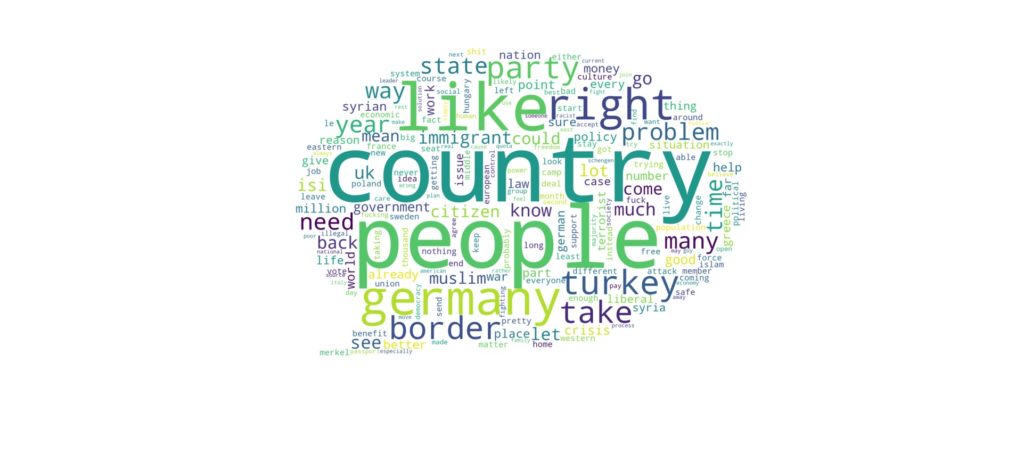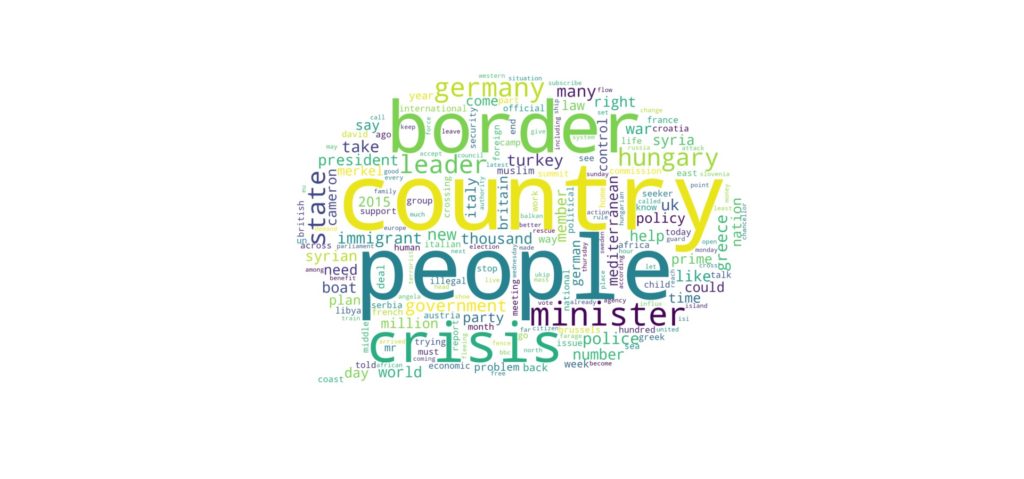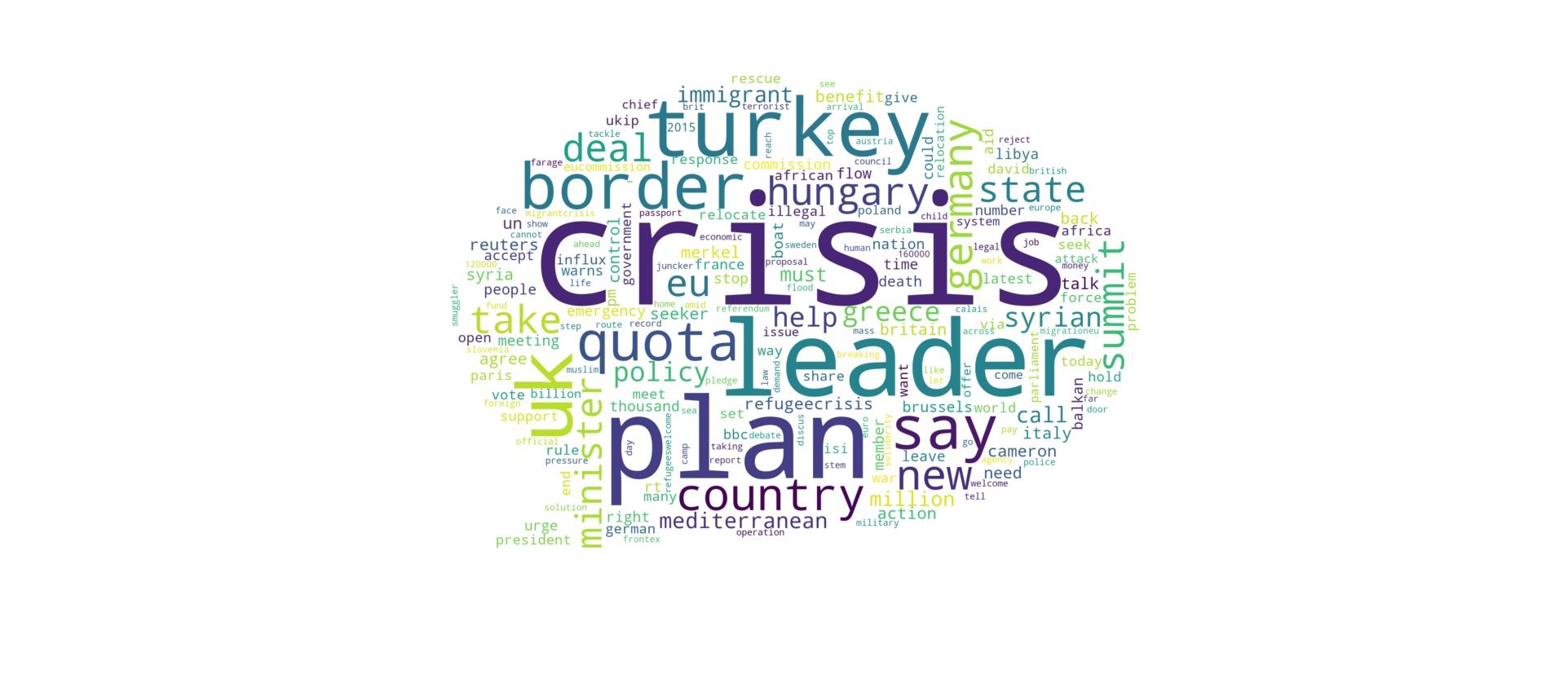How do we talk about migration and asylum issues on social media?
By Sara Schmitt, the University of Stuttgart
Asylum and migration policy are highly contested, emotional and ideologically fragmented issues, especially in times when migratory numbers are high. Analyzing social media discourses on migration and asylum issues can reveal new cleavages in society, political polarization and ideological fragmentation – and help us understand how discourses differ across different social media platforms.
In social sciences, analysis of media topics is used as a way to identify important political and social issues that circulate in media. Gatekeepers in traditional media like newspapers and television can both emphasize or omit certain aspects, and thus frame issues. In so doing, they actively shape the discourse of a topic to fit their world view, their sense of importance or their values. Actors like politicians, IOs, NGOs, and corporations, hence, can also use media as a strategic tool to influence audiences and push certain narratives, which is often called agenda-setting.
The advent of social media has changed media dynamics. Some argue that social media have had and continue to have a democratizing effect, because it is possible for anyone, not just the gatekeepers (i.e. journalists), to participate in political discussions through social media. Social media open up and enable analyses of direct communications like tweets, blog or forum posts, Facebook entries, videos, and images by different actors such as politicians, international or nongovernmental organizations, citizens, and journalists. As these actors communicate on the same or interrelated platforms, their specific contributions generate feedback effects on the others. From that vantage point, we can explore – among many other things – how central actors convey political messages, what topics they emphasize, or with whom they interact.
Does platform matter? Discourses on asylum and migration on Twitter versus Reddit and YouTube
However, all social platforms do not necessarily attract the same actors. Therefore, agenda-setting manifests itself differently on different social media, resulting in a variety of different discussions with different linguistic styles.
Taking the social media discourse on refugees and migrants in the European Union during the “refugee crisis” in 2015 as an example, the salience of the discourse across the platforms Twitter, YouTube and Reddit is quite unequally distributed. The number of comments or tweets pertaining to the issue of migration or asylum and the EU reflect why most political research focuses on Twitter: while numbers on YouTube (10,335) and Reddit (54,504) are relatively low, Twitter shows a comparatively high number of tweets (1,686,538) referencing keywords such as migration, asylum or refugees and the European Union. Even with this difference in salience, it is worth it to consider other social media platforms to get a more comprehensive picture on the content of online discourse.
Most frequent words on Reddit 2015

Looking at the most frequent words for 2015 on each platform reveals that migration seems to be discussed rather similarly across platforms. There are, however, some differences. On Reddit, the terms “right”, “party” and “Germany” feature more prominently, suggesting a discussion of how the political parties respond to the “refugee crisis” and a discussion of either the human/political rights or the political right – which has to be examined in detail with the context considered. On YouTube, the prominence of the words “border” and “crisis” illustrate that the “refugee crisis” is portrayed as a problem of EU and member states’ border management in contrast to a humanitarian issue.
Most frequent words on YouTube vs. Twitter 2015

The discussion on Twitter seems to take a more policy-oriented and action-focused turn with discussions of “leader”, “quotas”, “plan” and the “Turkey deal”, but also featuring “crisis” and “border” frequently. The exemplary word clouds show how analyses of different platforms can reveal different aspects of the discourse on the issue of asylum and migration. Adding such diverse data sources to the analysis can also be a way to identify where anti-immigrant or anti-refugee discourses originate, who perpetuates them and why or how they spread across platforms.
Setting the stakes online and offline
Why is mapping online discourses on migration and asylum valuable? Because they unveil a number of research fields for further exploration: how social media is used for anti-refugee or pro-refugee mobilization; how elites use the topic in electoral campaigns and to mobilize against opposition; which actor groups push certain policies; how policy change or the status quo is justified, what political ideologies can be tied to the discourse and many others. Social media can also serve as a way to identify powerful agenda-setting stakeholders on regional, national and supranational governance levels. This also ties back to the example illustrated above. While the word frequencies for the year 2015 give a general idea on how the issue was portrayed online, attributing specific wording to specific actors or identifying it as a certain ideological or strategic political strand gives it more meaning.
Therefore, careful analysis of the context in which these word frequencies are embedded is necessary to determine how the discourse on asylum and migration was constructed and what its implications are for citizen’s political views as well as policy.
Further reading:
Ben-David, Anat; Matamoros-Fernández, Ariadna (2016): Hate Speech and Covert Discrimination on Social Media: Monitoring the Facebook Pages of Extreme-Right Political Parties in Spain. In International Journal of Communication (10), pp. 1167–1193, checked on 8/18/2020.
Ekman, Mattias (2018): Anti-refugee Mobilization in Social Media: The Case of Soldiers of Odin. In Social Media + Society 4 (1), 205630511876443. DOI: 10.1177/2056305118764431.
Jungherr, Andreas (2016): Twitter use in election campaigns: A systematic literature review. In Journal of Information Technology & Politics 13 (1), pp. 72–91. DOI: 10.1080/19331681.2015.1132401.
Klinger, Ulrike; Svensson, Jakob (2015): The emergence of network media logic in political communication: A theoretical approach. In New Media & Society 17 (8), pp. 1241–1257. DOI: 10.1177/1461444814522952.
Kluknavská, Alena; Bernhard, Jana; Boomgaarden, Hajo G. (2019): Claiming the Crisis: Mediated Public Debates about the Refugee Crisis in Austria, the Czech Republic and Slovakia. In Journal of Refugee Studies, pp. 1–23, checked on 8/21/2020.
Törnberg, Anton; Törnberg, Petter (2016): Muslims in social media discourse: Combining topic modeling and critical discourse analysis. In Discourse, Context & Media 13, pp. 132–142. DOI: 10.1016/j.dcm.2016.04.003.

